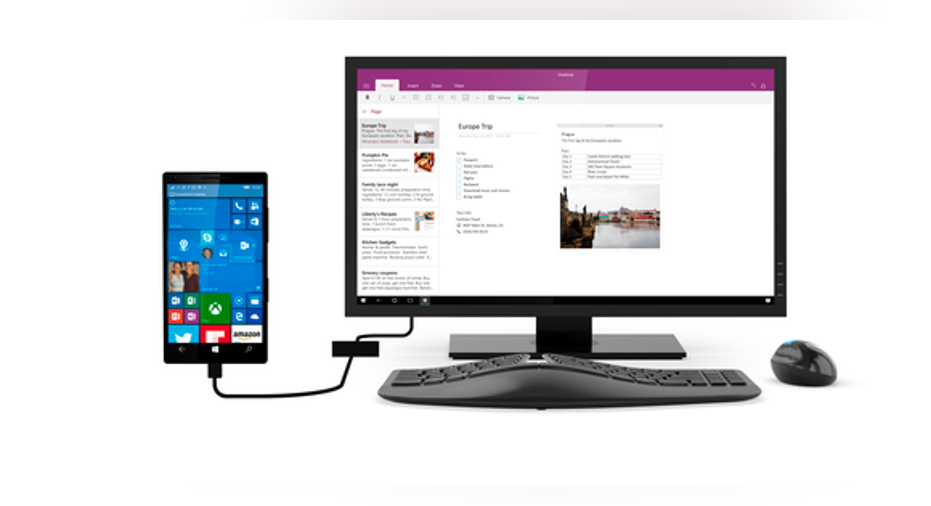This Could Be Microsoft's Hail Mary in the Smartphone Market

Image source: Microsoft.
Microsoft (NASDAQ: MSFT) was late to the mobile party, to say the least. The company's mobile operating system was left in the dust by both Alphabet's Android and Apple's iOS. By the time Windows 10 Mobile showed up on devices last year, the battle was already over.
Microsoft's multibillion-dollar purchase of Nokia's phone operations, meant to give the company a meaningful share of the mobile device market, turned out to be a disaster. A $7.6 billion write-off followed. Just 0.4% of smartphones shipped with Windows during the second quarter of this year, compared to 87.6% for Android and 11.7% for iOS.
Rumors about a potential Surface Phone, sharing the name of Microsoft's successful line of tablets and convertibles, have been swirling for quite some time. Given the state of Windows on mobile devices, it's hard to imagine such a device being successful. But Microsoft might have one trick up its sleeve. The company is reportedly working on bringing x86 emulation to the ARM version of Windows 10 as part of its Redstone 3 update next year. If that turns out to be the case, a Surface Phone could actually work.
A PC in your pocket
The big problem with running Windows on devices powered by ARM chips is that Windows desktop applications don't work. Those applications are compiled for x86 machines, powered by Intel or AMD chips. Microsoft's Surface tablets that ran on ARM chips were a disaster because they were missing the vast majority of Windows applications.
With Windows 10 came Universal Apps, an attempt by Microsoft to make Windows architecture-agnostic. A Universal Windows app can run on any device running Windows 10, regardless of the type of chip. The Universal versions of Microsoft's office suite, for example, can run on desktops, laptops, tablets, or mobile devices.
In the long run, Universal Apps may solve Microsoft's problems with Windows on ARM devices. We could even eventually see ARM-based Windows PCs if the Universal App ecosystem becomes robust enough. But right now, most Windows applications that people use are still desktop applications that require an x86 chip.
What do desktop applications have to do with smartphones? Microsoft introduced a feature called Continuum last year, which allows a Windows phone to present a desktop PC interface when plugged into an external monitor. Only universal apps can be run, so the feature essentially turns a smartphone into a not-very-useful PC.
Continuum at work. Image source: Microsoft.
A move to include x86 emulation could make Continuum a lot more useful. If Microsoft allows standard desktop applications to be run in Continuum mode, a Windows smartphone running an ARM chip suddenly becomes a full-featured PC, able to run any desktop app thrown at it. Emulation comes with a performance penalty, but it would make Windows Mobile far more versatile, giving it a feature no other smartphone could match.
This isn't a feature the typical smartphone user cares about, but power users and business users who would find it convenient to carry around a full-featured Windows PC in their pocket could give Microsoft a second look. A Surface Phone launched with x86 emulation and Continuum could be a hit, at least relative to Microsoft's previous attempts at flagship smartphones.
There's not much of a chance that Windows becomes a mainstream mobile operating system at this point. But Microsoft could carve out a niche for itself by enabling desktop apps in Continuum mode, appealing to a group of customers willing to pay a premium for such functionality. Both the Surface Phone and the inclusion of x86 emulation are just rumors at this point, but combining the two could give Microsoft a genuine win in the mobile market.
10 stocks we like better than Microsoft When investing geniuses David and Tom Gardner have a stock tip, it can pay to listen. After all, the newsletter they have run for over a decade, Motley Fool Stock Advisor, has tripled the market.*
David and Tom just revealed what they believe are the 10 best stocks for investors to buy right now...and Microsoft wasn't one of them! That's right -- they think these 10 stocks are even better buys.
Click here to learn about these picks!
*Stock Advisor returns as of November 7, 2016.
Suzanne Frey, an executive at Alphabet, is a member of The Motley Fool's board of directors. Timothy Green has no position in any stocks mentioned. The Motley Fool owns shares of and recommends Alphabet (A and C shares). The Motley Fool owns shares of Microsoft. The Motley Fool recommends Intel. Try any of our Foolish newsletter services free for 30 days. We Fools may not all hold the same opinions, but we all believe that considering a diverse range of insights makes us better investors. The Motley Fool has a disclosure policy.



















